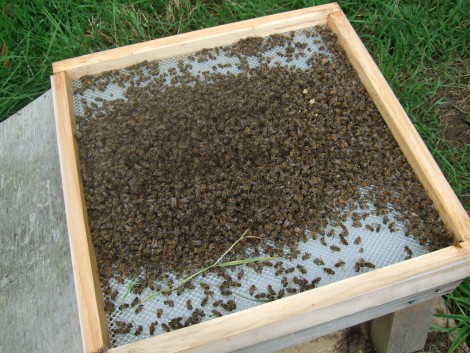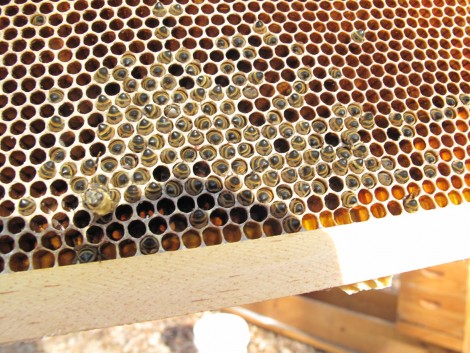 Abraham Lincoln
If given the truth, the people can be depended upon to meet any national crisis...
Abraham Lincoln
If given the truth, the people can be depended upon to meet any national crisis...
 Guildford news...
for Guildford people, brought to you by Guildford reporters - Guildford's own news service
Guildford news...
for Guildford people, brought to you by Guildford reporters - Guildford's own news service
Beekeeper’s Notes March 2016 – Starving Bees Turn Cannibal
Published on: 1 Mar, 2016
Updated on: 2 Mar, 2016
Hugh Coakley keeps bees in Worplesdon. In this month’s notes, he talks about how honeybees will suck the fluids from their own brood to save the colony from starvation.

Richard Parker’s tombstone in Woolston, Southampton. A relative of Richard Parker quotes his grandfather as saying that Richard’s grisly death was the family’s first step into catering.
There is a famous case in 1884 of sailors resorting to cannibalism when shipwrecked. Three sailors and a cabin boy, Richard Parker, took to the lifeboats when their yacht foundered in the southern seas.
After two weeks with no provisions, the cabin boy fell into a coma and the other sailors, in accordance with the ‘custom of the seas’, decided to kill him and eat him to survive.
They were rescued and duly reported their terrible dilemma in the expectation that the ‘custom of the seas’ defence would be accepted.
To cut to the chase, they were convicted of murder and to hang which was later reduced to a prison sentence.
It became a cause celebre in Victorian times and public opinion forced the accepted practise of cannibalism in extremis to be outlawed.
There are no such sensitivities in a beehive.
If you are a bee and you have honey in your hive that you can get at, then no problem.
If you are that same bee and you are running out of honey to eat, then it is a big problem.
There is not much in the way of nectar to gather at this time of year. It is generally too cold to fly anyway
A typical colony will get through about 15kgs (30lbs) of honey through the winter. That’s a lot of honey and it is a race against time. Will the honey last long enough before the spring abundance comes?

Dead bees on the hive floor – it happens very quickly when the colony runs out of food or they are too cold to move to access it. Photo from talkingwithbees.com.
The bee cannot store infinite honey to last it whatever the weather throws up. If the weather is unkind and the honey stores run out, then curtains.
It might only be a matter of days but even a couple of days without food is enough to kill off a whole colony. The colonies are building up now so the amount of food needed to keep it going is also increasing.
In the last resort, the bees will suck the body fluids from their own brood in an attempt to save the colony. The brood when hatched cannot survive without the colony to support it. So, like the sailors in 1884, they eat the youngest.

Often the last thing a bee does before expiring is to crawl into a cell – presumably searching for food. The photo here shows the bees head down in the cells.
I have once seen a starving colony and it is a sad and miserable sight. Dead bees litter the bottom of the hive. The bees still alive are slow moving and shivery and they will often crawl into the empty cells, presumably looking for food.
It can also happen if the bees cluster in the wrong place, even when the beekeeper has harvested honey wisely . Bees can also starve in the summer, in the ‘June gap’ between spring and height of summer, when forage is scarce.
So, my bees went into the winter with plenty of stores. I also topped them up with some baker’s fondant recently. But I still cannot guarantee that they will have survived the winter.
Fingers crossed.
Recent Articles
- Guildford Institute’s Crowdfunding Project for Accessible Toilet in its New Community and Wellbeing Centre
- Letter: Guildford – Another Opportunity Missed?
- Letter: GBC’s Corporate Strategy – Where Is the Ambition?
- My Memories of John Mayall at a Ground-breaking Gig in Guildford Nearly Six Decades Ago
- Westborough HMO Plans ‘Losing the Heart of the Street’ Says Resident
- College Invests to Boost Surrey’s Economy and Close Digital Skills Gap
- Community Lottery Brings Big Wins for Local Charities
- GBC Housing Plan Promises ‘A Vibrant Urban Neighbourhood’ Near Town Centre
- Hospital Pillows ‘Shortage’ at the Royal Surrey
- Updated: Caravans Set Up Camp at Ash Manor School


Search in Site
Media Gallery
Dragon Interview: Local Artist Leaves Her Mark At One of England’s Most Historic Buildings
January 21, 2023 / No Comment / Read MoreDragon Interview: Lib Dem Planning Chair: ‘Current Policy Doesn’t Work for Local People’
January 19, 2023 / No Comment / Read MoreA3 Tunnel in Guildford ‘Necessary’ for New Homes, Says Guildford’s MP
January 10, 2023 / No Comment / Read More‘Madness’ for London Road Scheme to Go Ahead Against ‘Huge Opposition’, Says SCC Leader
January 6, 2023 / No Comment / Read MoreCouncillor’s Son Starts Campaign for More Consultation on North Street Plan
December 30, 2022 / No Comment / Read MoreCounty Council Climbs Down Over London Road Works – Further ‘Engagement’ Period Announced
December 14, 2022 / No Comment / Read MoreDragon Interview: GBC Reaction to the Government’s Expected Decision to Relax Housing Targets
December 7, 2022 / No Comment / Read MoreHow Can Our Town Centre Businesses Recover? Watch the Shop Front Debate
May 18, 2020 / No Comment / Read More









Recent Comments